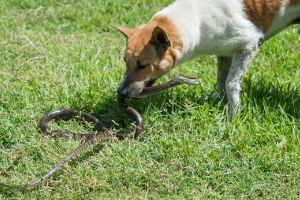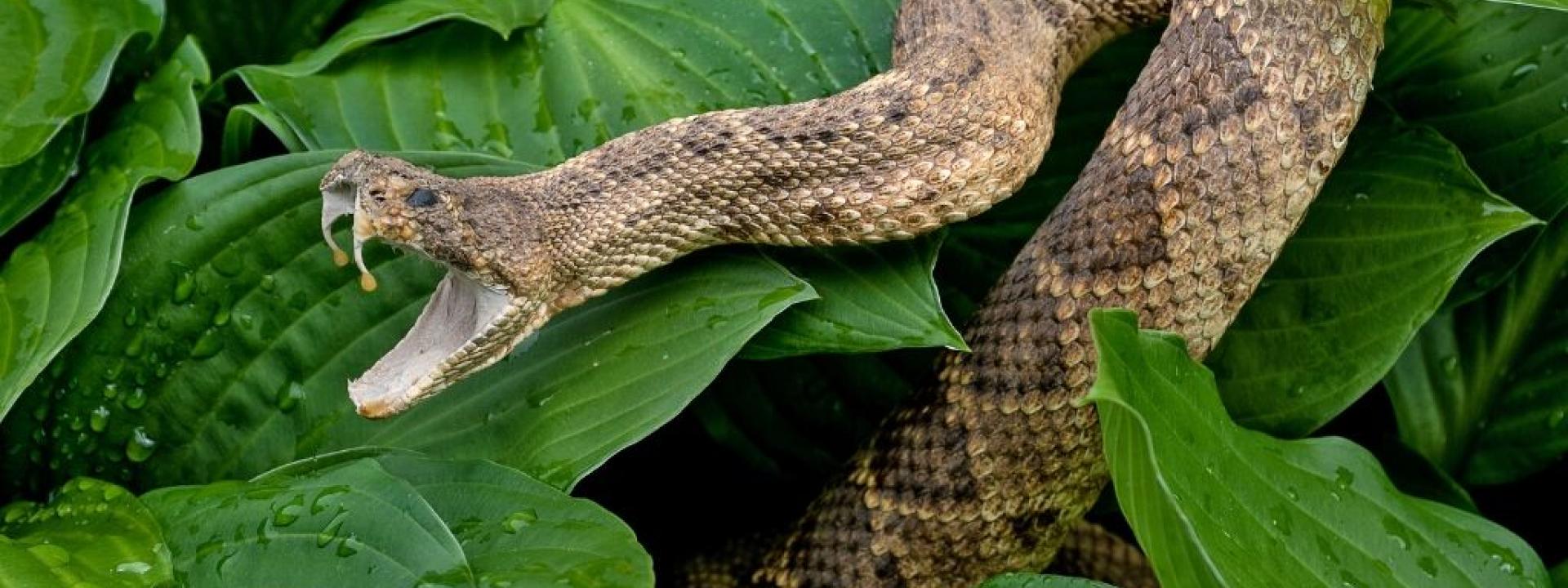One benefit of our quarantine time during this COVID-19 pandemic is that many of us are getting more physical activity, and our dogs are getting more exercise, too. After all, getting moving outside is nearly the only thing to do for leisure at this point! The downside is that this is the time of year that many of us need to be hyper-vigilant about snakes when taking walks or hikes. Every single state in the U.S. has venomous snakes, and the one considered to be the most lethal - the rattlesnake - strikes its potentially deadly blow the most in California and Arizona. We're certainly not advocating you avoid your daily exercise, but we're taking the opportunity in this blog post to share information on the prevention of and treatment for snakebites.
How to Avoid Snakebites
Dogs are naturally curious animals and are not afraid of snakes. Learning where snakes live is one of the keys to keeping your dogs from coming into contact with them. Snakes tend to live in tall grass, woodpiles, bushes, and underneath outdoor debris to avoid sunlight. Snakes will bite when they feel threatened. The cottonmouth snake lives in tall grass in and near the water's edge.
When going outdoors, it's advised to keep your dog on a leash and to avoid these areas. Yard maintenance is also necessary to keep away an attractive nesting ground for snakes near your home. When walking your dog, stay on well-kept trails and avoid walks at night unless in a well-lit area. Don't let your dogs stray from your sight.

Outdoor Enthusiasts Should Take Classes
Snake avoidance training is helpful for owners and dogs who live on large properties, take off-leash hikes, and spend a lot of time outdoors. Snake training can help anyone with a dog who wants to prevent future snakebites. Seek advice from your veterinarian on whether you have trainers that touch on this subject in your area.
What About a Rattlesnake Vaccine?
There is a rattlesnake vaccine, but there have been no controlled studies in order to prove its effectiveness. That said, the vaccine may create protective antibodies that might be useful in neutralizing some of the injected venoms. It’s important to mention that even if the dog has been vaccinated, he will still need to be examined by a veterinarian to determine just how much treatment will be necessary. Please talk to your veterinarian about whether or not this vaccine is something you should consider for your pet.
How to Tell if Your Pet Has Been Bitten and What to Do
Snakes bite dogs and cats most commonly around their mouth, ankles, and legs. Snakebites are small and hard to identify, but the wound will begin to quickly swell, bruise, and bleed a little. There will be significant pain, but the amount of venom released will determine the seriousness of the bite.
Most pets will display similar signs when bitten by a venomous snake. Coral snake bites are different than pit vipers because they cause nervous system failure, which can manifest as tremors or even seizures. When bitten on the mouth or the head, it can cause trouble with your pet's breathing. Some pets can go into cardiovascular shock, which raises their heart rate and can potentially cause your pet to go unconscious, as well as cause vomiting and diarrhea. After these signs, the area the snake has bitten can turn black and die from the venom, which can cause other serious complications.

What to Do If Your Pet Has Been Bitten By a Snake
All snakebites should be taken seriously and considered an emergency. Taking your pet to see a veterinarian immediately is critical. If it can be done safely, immobilize the part of the animal that has been bitten by the snake. Try to keep it at or below the level of the heart. Keep your pet calm and immobile; carry if necessary.
Seek veterinary attention as soon as possible. Try to identify the snake if it can be done without risk. Do not attempt to capture or kill the snake! It is helpful to identify the type of snake to aid your veterinarian with treatment. Do not bring the snake into the veterinarian’s office – a photograph will do.
It is NOT recommended to use a tourniquet or ice pack, to attempt to remove the venom, or to administer medication to your pet unless directed to do so by a veterinarian.
Treatment for Snakebites
The first goal in snakebite treatment is to keep the venom from circulating in large quantities throughout the body. However, keeping all the venom in the area of a bite (as happens with ice packs or tourniquets) may cause severe muscle damage.
Antivenin (aka "antivenom") administered at the hospital is the most direct and helpful treatment for your pet. Ideally, Antivenin is administered within two hours of the bite to be the most effective. Antivenin can cause severe allergic reactions in some pets, and must be administered under controlled conditions and monitored closely. Most pets that have been bitten will need to be admitted to the hospital for treatment, and some pets can have large areas of dead tissue that need to be surgically cleaned over several days or weeks.
Once you arrive at the clinic, your pet will receive pain medication, IV fluids, and the area where the pet was bitten will most likely be shaved. Some diagnostics should be performed (including bloodwork). Plasma may also be helpful in cases where there is severe vasculitis (inflammation of the blood vessels). Once the venom is in the bloodstream, it can destroy a patient’s blood cells. Antivenin works to neutralize the effects of the venom and, in some cases, more than one dose of antivenin might be necessary.
As you've gathered, a venomous snake biting your dog or your cat is a traumatic and possibly deadly experience, so being aware of your surroundings and following the advice in this post is crucial to keeping your pets safe. If you have any further questions on how to avoid snakebites, please don't hesitate to call us.

